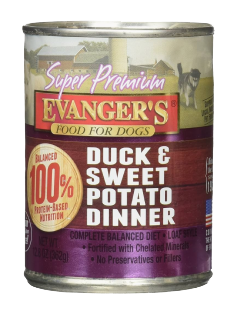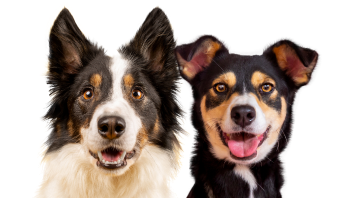Best Vegetarian Dog Food

DogFoodAdvisor is reader supported See how
All reviews are 100% impartial but if you buy using links on this page, we may earn a referral fee.
What’s the best vegetarian dog food?
Dogs are omnivores, which means they can eat both animal and plant-based foods.
While dogs are biologically adapted to consume a diet that includes meat, it is possible for dogs to survive on a carefully planned vegetarian diet.
When considering a vegetarian diet for your dog, keep the following points in mind:
Dogs have specific nutritional needs, including essential amino acids (building blocks of protein), vitamins, and minerals, that are traditionally met through a diet that includes animal-based proteins. Whatever diet you choose for your dog – meat or plant based, it’s crucial to ensure that they get all the necessary nutrients to maintain good health.
Dogs require high-quality protein to thrive. Plant-based protein sources like soy, lentils, chickpeas, and quinoa can be used, but they may not provide all the essential amino acids in the right proportions. Combining different plant-based protein sources may help address this issue.
It’s likely that your dog will need some supplementation to meet their nutritional needs adequately. Specific nutrients, such as vitamin B12, taurine, and certain fatty acids, are primarily found in animal-based sources and may need to be added to a vegetarian diet.
Every dog is unique, and what works for one dog may not work for another. Some dogs may adapt well to a vegetarian diet, while others may experience health issues or deficiencies. Before making any significant changes to your dog’s diet, consult with a veterinarian or a veterinary nutritionist. They can assess your dog’s specific needs and help you develop a balanced vegetarian diet plan, or recommend alternative diets that align with your values while meeting your dog’s nutritional requirements.
If you’re considering a vegetarian diet for ethical or personal reasons, it’s crucial to prioritize your dog’s health and well-being. Always consult a professional to ensure your dog’s diet is nutritionally complete and appropriate for their individual needs.
You might also find this article Can Dogs Be Vegetarian or Vegan? by the founder of the Dog Food Advisor, Dr Mike Sagman, helpful.
Below, you can read our recommendations of the best vegetarian dog food. You’ll also learn the answer to each of the most frequently asked questions we get about vegetarian dog food.
Please note: We are sure you’ve noticed that these vegetarian foods are currently unrated. This is because our review methodology favors dog foods rich in meat, and judging a plant-based diet against this criteria would always give a low rating. Studies of plant-based diets for dogs are showing some great results, as well as providing preferable options for many dogs with allergies or those wanting to choose more environmentally sustainable options. We’ll leave these unrated whilst we consider how best to rate this new offering within the dog food market.
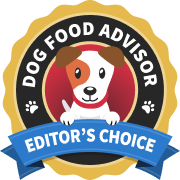
Best Vegetarian Dog Food April 2024
Here are The Dog Food Advisor's best vegetarian dog food brands for April 2024
-
1. Halo
Unrated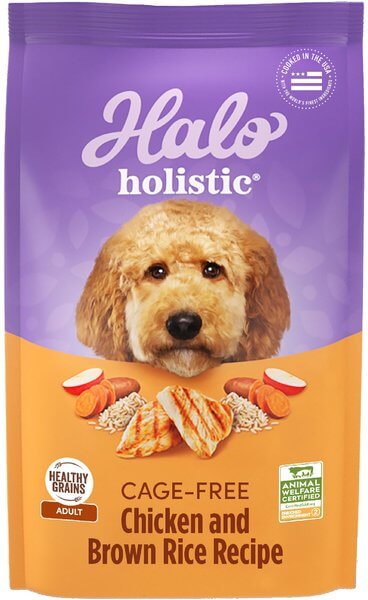
Halo Holistic Vegan Dog Food Complete Digestive Health Plant- Based Recipe With Superfoods Formula is one of 3 dry recipes included in our review of the Halo Holistic Dry product line.
Halo Holistic Vegan Dog Food Complete Digestive Health Plant- Based Recipe With Superfoods Formula derives the bulk of its protein from plants. Dry matter label analysis reveals the recipe contains 33.3% protein, 18.8% fat and 39.9% estimated carbs… resulting a fat-to-protein ratio of about 56%.

Our plant-based recipes are made with sustainable, humane ingredients that provide complete and balanced nutrition to your pet — with a kinder impact on the planet. Made with 100% vegan ingredients, they include high-quality plant protein and no animal ingredients, which means lower greenhouse gas emissions. We also use only non-GMO ingredients to support ecological biodiversity and well-being.
Read our review of the full Halo Dog Food (Dry) range here
Main Ingredients Oats, peas, chickpeas, potato protein, brewers dried yeast Type Grain-Inclusive Protein Percentage 33.3% AAFCO Standards Adult Maintenance Best For Puppies and Dogs Sample buyer review...
Read more buyer reviews at HaloPets.com"I eat plant-based food so I’m happy there’s this great option for my pup too. He loves it!"
-
2. Gather
UnratedGather Endless Valley Vegan Recipe With Organic Peas is one of 3 dry recipes included in our review of the Gather product line.
Gather Endless Valley Vegan Recipe With Organic Peas derives the bulk of its protein from plants. Dry matter label analysis reveals the recipe contains 24.4% protein, 12.2% fat and 55.3% estimated carbs… resulting in a fat-to-protein ratio of about 50%.
A plant based diet is a wonderful thing for dogs, their people and the planet. What’s important is that dogs consume enough protein containing all essential amino acids, as well as complementary ingredients to provide complete and balanced nutrition. That’s exactly what you’ll find in our Endless Valley recipe; packed with protein from certified organic, sustainably grown peas plus organic oats, organic barley and lentils for all the essential amino acids.
Read our review of the full Gather Dog Food (Dry) range here
Main Ingredients Organic peas, organic barley, organic oats, lentils, organic sunflower oil (preserved with mixed tocopherols) Type Grain-Free Protein Percentage 24.4% AAFCO Standards Adult Maintenance Best For Puppies and Dogs Sample buyer review...
Read more buyer reviews at GatherPetFood.com"My senior cocker spaniel came to life on this food. She developed more of a spunky personality. I think it gave her more energy and she’s so much happier. Love this food."
-
3. Purina
Unrated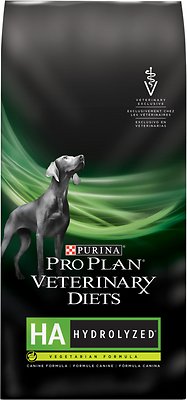
Purina Pro Plan Veterinary Diets HA Hydrolyzed Vegetarian Recipe is one of 2 dry recipes included in our review of the Purina Pro Plan Veterinary Diets HA product line.
Purina Pro Plan Veterinary Diets HA Hydrolyzed Vegetarian Recipe derives the bulk of its protein from plants. Dry matter label analysis reveals the recipe contains 20% protein, 8.9% fat and 63.1% estimated carbs… resulting in a fat-to-protein ratio of about 44%.
Purina Pro Plan Veterinary Diets HA Hydrolyzed Canine Formulas contain hydrolyzed protein, which is protein that has been broken down into small components to be less likely to cause an adverse food reaction in certain dogs. HA Hydrolyzed is highly digestible and made with high-quality ingredients.
Read our review of the full Purina Pro Plan Veterinary Diets HA Dog Food (Dry) range here
Main Ingredients Corn starch, hydrolyzed soy protein isolate, coconut oil, partially hydrogenated canola oil preserved with tbhq, powdered cellulose Type Grain-Free Protein Percentage 20% AAFCO Standards Adult Maintenance Best For Puppies and Dogs Sample buyer review...
Read more buyer reviews at ProPlanvetDirect.com"My Amelia has been on the HA food for years. She still loves it and she does very well on this food."
-
5. Health Extension
Unrated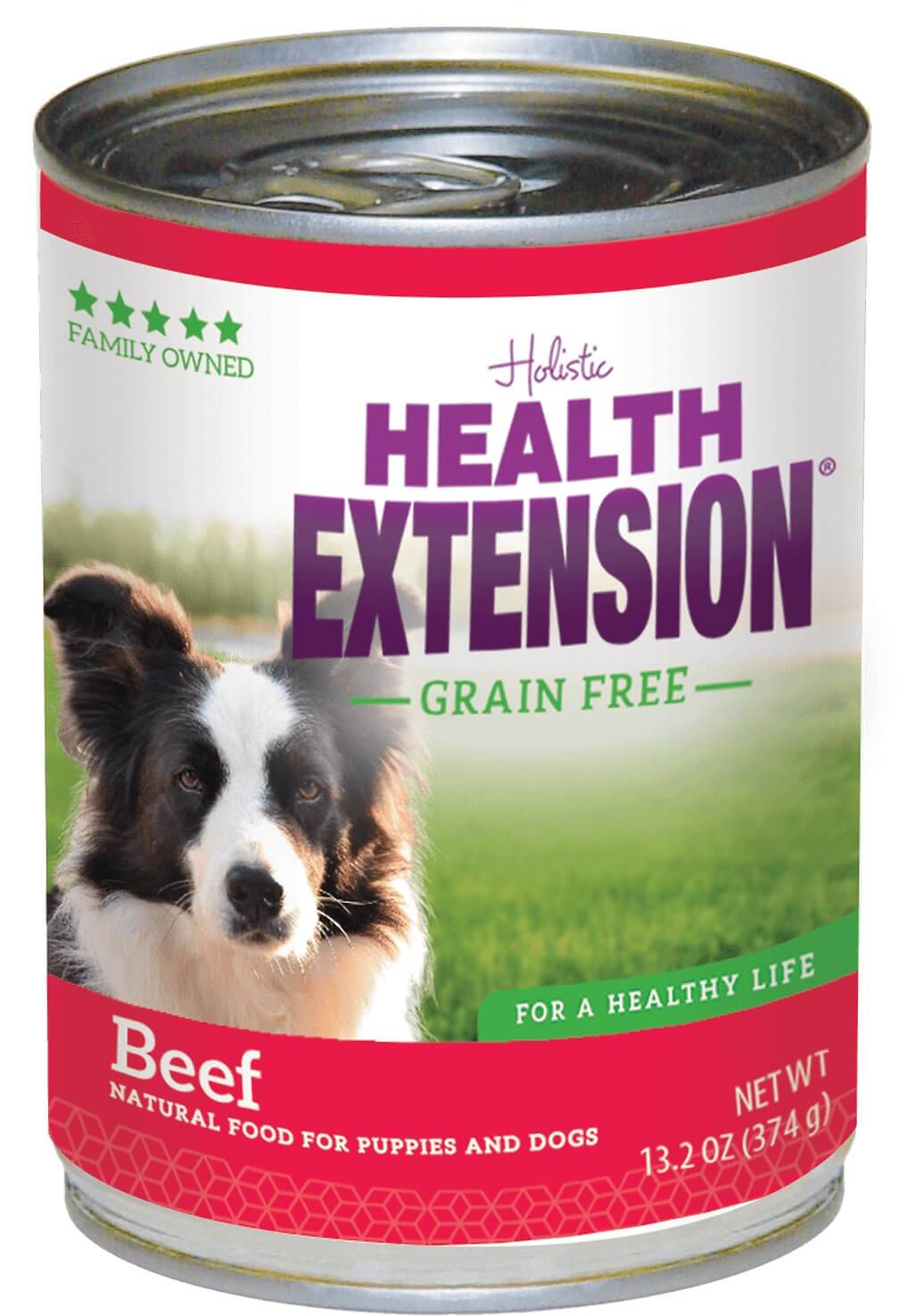
Health Extension Vegetarian Entrée is one of 18 wet recipes included in our review of the Health Extension Canned product line.
Health Extension Vegetarian Entrée derives the bulk of its protein from plants. Dry matter label analysis reveals the recipe contains 29.2% protein, 8.3% fat and 54.5% estimated carbs… resulting in a fat-to-protein ratio of about 29%.
This terrifically tasty recipe is great for those who prefer to feed their dogs a vegetarian diet or serve a few meatless meals every week. It’s packed with delicious, highly nourishing ingredients like sweet potatoes, butternut squash, carrots, peas, blueberries, cranberries, and kale. This diet is especially beneficial for dogs with common food allergies or digestive issues, because it’s formulated to provide complete and balanced nutrition without animal proteins of any kind. Health Extension Vegetarian Entree is perfect for canines of all ages and breeds, from puppies to senior adults. Your pup is sure to love the taste and texture of this smooth paté.
Read our review of the full Health Extension Dog Food (Canned) range here
Main Ingredients Sweet potatoes, butternut squash, water sufficient for processing, brown rice, carrots Type Grain-Inclusive Protein Percentage 29.2% AAFCO Standards Adult Maintenance Best For Puppies and Dogs Sample buyer review...
Read more buyer reviews at HealthExtension.com"My dogs ate it, they loved it, good product for the money! Great ingredients, thanks!"
-
6. Natural Balance
Unrated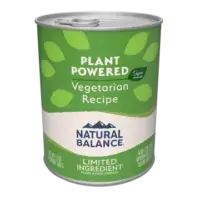
Natural Balance Limited Ingredient Vegetarian is one of 7 wet recipes included in our review of the Natural Balance Limited Ingredient product line.
Natural Balance Limited Ingredient Vegetarian derives the bulk of its protein from plants. Dry matter label analysis reveals the recipe contains 22.7% protein, 13.6% fat and 55.6% estimated carbs… resulting in a fat-to-protein ratio of about 60%.
This plant powered recipe provides a complete and balanced meal for dogs who might experience sensitivities to certain animal proteins. It’s also vegan-friendly for households looking for a healthy alternative to a meat-based diet. Made with wholesome grains like brown rice, barley, and oat groats. Potatoes and peas provide complex carbohydrates. Vegetable broth adds flavor for a delicious meal your dog will love!
Read our review of the full Natural Balance Limited Ingredient Dog Food (Wet) range here
Main Ingredients Vegetable broth, potatoes , ground brown rice, ground barley, oats Type Grain-Inclusive AAFCO Standards Adult Maintenance Best For Dogs Sample buyer review...
Read more buyer reviews at Chewy.com"Since I started giving this dog food to my dogs, their liver enzymes have decreased. I made the mistake of changing to another brand’s vegetarian diet and their enzymes increased in both dogs. Now, I will just stick to the brand that is healthier for them. I want them to have a long life"
More Top Picks
To view more top dog foods by category… click the link below that best meets your personal feeding needs.
Here are the most frequently asked questions we get about feeding vegetarian food:
Frequently Asked Questions
Is a vegetarian diet nutritionally complete for dogs, and can it meet all their dietary requirements?
Vegetarian diets are now available which are nutritionally complete.
Dogs have certain essential nutrient requirements that must be met to maintain good health, and these nutrients are typically obtained from animal-based sources. When transitioning a dog to a vegetarian diet, it’s essential to find suitable plant-based alternatives to meet their nutritional needs.
Some key nutrients that are crucial for dogs and may require special attention in a vegetarian diet include:
- Protein: Dogs require high-quality protein with all essential amino acids. Plant-based protein sources like soy, lentils, chickpeas, quinoa, and peas can be used, but they may not provide all amino acids in the right proportions. Careful combinations of plant based proteins are used to balance the amino acids supplied to the proportions needed.
- Vitamin B12: Vitamin B12 is primarily found in animal-based foods. In a vegetarian diet for dogs, a reliable source of vitamin B12 must be included through supplements or fortified foods.
- Taurine: Taurine is an essential amino acid for dogs, and it is mostly found in animal tissues. It is crucial to ensure adequate taurine intake in a vegetarian diet, especially for certain dog breeds that are prone to taurine deficiency-related issues.
- Omega-3 fatty acids: Dogs require omega-3 fatty acids, such as EPA and DHA, which are commonly found in fish oil. Alternative sources like algae-based supplements can be used in a vegetarian diet to provide these essential fatty acids.
- Iron: Plant-based iron sources like lentils, tofu, and leafy greens can be used, but they may not be as easily absorbed as heme iron found in animal-based foods. Combining iron-rich plant foods with vitamin C-rich foods can enhance iron absorption.
- Calcium and phosphorus: These minerals are essential for bone health. Care should be taken to ensure proper calcium-to-phosphorus ratios, as well as adequate intake of calcium in a vegetarian diet.
- Zinc: Plant-based zinc sources like legumes and whole grains can be used, but their bioavailability may be lower than in animal-based foods.
What are the potential health risks or deficiencies associated with a vegetarian diet for dogs?
Feeding dogs a vegetarian diet can present several potential health risks and deficiencies if not carefully managed. While some dogs may adapt well to a well-balanced vegetarian diet, others may be more susceptible to certain issues.
As mentioned above, dogs require high-quality protein with all essential amino acids to maintain their health and muscle mass. Plant-based proteins may lack certain amino acids, and without proper planning, dogs could suffer from protein deficiencies.
Taurine is an essential amino acid for dogs, and it is primarily found in animal-based proteins. A lack of taurine in a vegetarian diet can lead to serious health problems, including heart disease and eye issues.
Vitamin B12 is only naturally found in animal-based foods. Without supplementation or fortified foods, dogs on a vegetarian diet may not get enough vitamin B12, leading to anemia, nerve problems, and overall weakness.
Omega-3 fatty acids, such as EPA and DHA, are essential for a dog’s skin, coat, and overall health. While some plant sources provide omega-3s in the form of ALA, they may not be efficiently converted to the active forms (EPA and DHA) that dogs need.
Dogs need a proper balance of calcium and phosphorus for healthy bone development and maintenance. Without careful design plant-based diets may have an inadequate balance of these minerals, leading to bone and dental issues.
Some dogs might have difficulty digesting certain plant-based proteins or high-fiber diets, leading to gastrointestinal discomfort, gas, or diarrhea. For other dogs this higher fiber diet and plant based proteins may suit them better than a traditional diet.
Plant-based diets may not provide enough calories for highly active dogs or those with higher energy needs, such as working dogs or athletes.
Like all protein sources and ingredients, there is the potential that dogs can develop allergies to specific plant-based proteins or other components in a vegetarian diet, leading to skin issues, ear infections, or gastrointestinal problems. For dogs with allergies to animal-based ingredients a vegetarian diet can be a great option to alleviate their allergy symptoms.
In all cases, inadequate nutrition can impact reproductive health, leading to decreased fertility and complications during pregnancy and lactation.
Some dogs might exhibit changes in behavior or energy levels if their nutritional needs are not adequately met, affecting their overall well-being.
To mitigate these potential risks, it’s essential to work with a veterinarian or a veterinary nutritionist to design a balanced vegetarian diet that meets the specific needs of the individual dog. Regular health check-ups and monitoring are crucial to address any deficiencies or health issues promptly.
In some cases, a vegetarian diet might not be suitable for certain dogs, and alternative dietary approaches may be recommended to ensure optimal health and well-being. Many vegetarian diets are formulated to meet AAFCO nutritional profiles and carefully supply the nutrients required by your dog.
As with any dietary change it is important to monitor your dog for signs that the diet isn’t suiting them.
You can also support their diet with specific supplements and fortified foods to ensure they receive the essential nutrients they need including Vitamin B12 supplements, protein supplements and calcium supplements.
What are some signs that my dog may not be thriving on a vegetarian diet?
If you have transitioned your dog to a vegetarian diet, it’s essential to monitor their health and well-being closely to ensure they are thriving and getting all the necessary nutrients.
Here are some signs that your dog may not be thriving on a vegetarian diet:
- Weight loss or weight gain: Significant changes in your dog’s weight, either gaining or losing weight, can indicate an issue with their diet. Sudden weight loss may be a sign of inadequate calorie intake or nutrient deficiencies, while weight gain could result from excessive carbohydrate consumption.
- Dull coat or skin issues: A lack of essential fatty acids, such as omega-3s, can lead to a dull, dry coat and skin problems like flakiness, itching, or irritation.
- Lethargy or decreased energy levels: If your dog seems less active or lethargic, it could be a sign of insufficient energy intake or a deficiency in vital nutrients.
- Muscle loss or weakness: Inadequate protein intake can lead to muscle loss, weakness, and a decrease in muscle mass.
- Gastrointestinal issues: Diarrhea, vomiting, gas, or other digestive problems can be indicators of dietary issues or sensitivities to certain ingredients in the vegetarian diet. Remember whenever changing your dog’s food to do it gradually to reduce the chances of digestive upset.
- Changes in behavior: Behavioral changes, such as increased irritability or aggression, could be linked to nutritional deficiencies affecting your dog’s overall well-being.
- Dental problems: Poor nutrition can impact dental health, leading to issues like tooth decay or gum disease.
- Frequent illness or weakened immune system: A lack of essential nutrients can compromise your dog’s immune system, making them more susceptible to infections and illnesses.
- Slow growth or development in puppies: Puppies require specific nutrients for proper growth and development. A vegetarian diet that does not meet these needs can result in stunted growth or developmental issues.
- Urinary issues: Unbalanced mineral intake can lead to urinary problems, including the formation of urinary stones or crystals.
- Behavioral signs of food-seeking: If your dog seems to be constantly searching for food or eating non-food items (pica), it may indicate that they are not getting enough satisfaction or nutrients from their current diet.
If you observe any of these signs or have concerns about your dog’s health and well-being on a vegetarian diet, it’s crucial to consult with a veterinarian or a veterinary nutritionist. They can assess your dog’s specific needs and help you make any necessary adjustments to the diet or recommend alternative dietary options to ensure your dog’s health is not compromised



